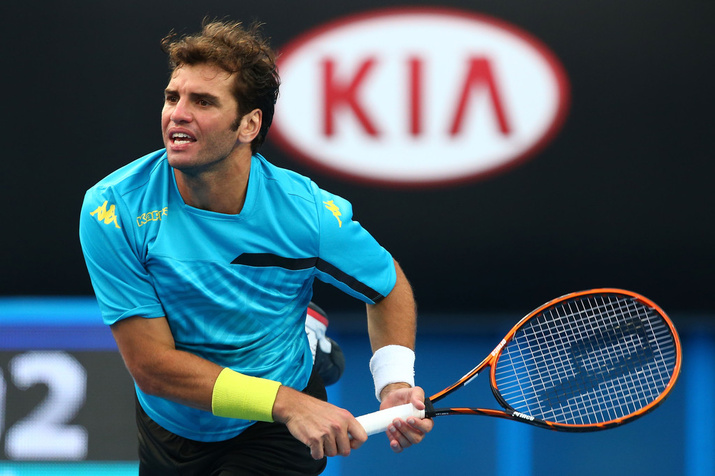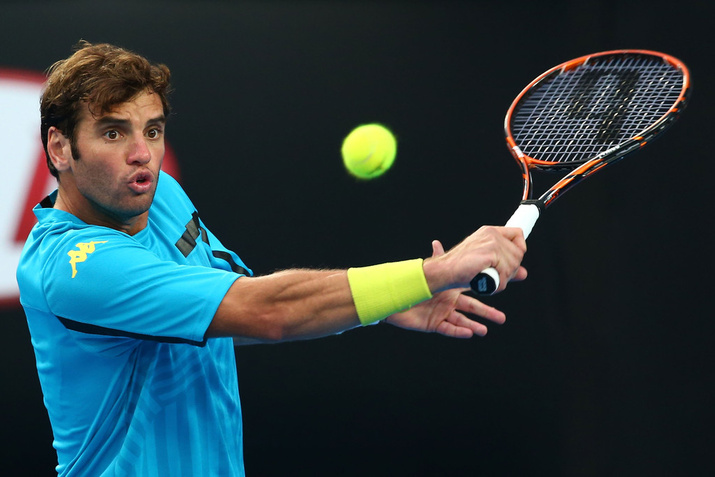Don't miss any stories → Follow Tennis View
FollowMalek Jaziri Incident Exposes Politics in Tennis
Malek Jaziri and Tunisian tennis have had quite the eventful month. Two weeks ago at the Asutralian Open, Jaziri made tennis history by being the first-ever Tunisian player to reach the third round of a Grand Slam. His ranking keeps rising, and he has never been playing better tennis in his career.

This brings us to Wednesday, when he drew Denis Istomin in the first round of Montpelier. Istomin is a talented but inconsistent player who has struggled recently. Jaziri obliterated him in the first set, winning it in 38 minutes (which included two visits to Jaziri by the medical staff). Then, unfortunately, the expected happened–and everyone who was paying attention knew this was coming.
There are people who had the immediate sense that this match was actually fixed. The pre-match betting trends all went heavily towards Istomin. We see suspicious activity like this sometimes in Challengers or Futures tournaments, and a big deal can be made out of it. But nothing this obvious ever happens at the ATP level.
It wasn't a fix though, not in the obvious sense. You see, Dudi Sela of Israel won his first-round match on Tuesday. His next opponent would be the winner of Jaziri/Istomin. So, as I said, from that moment on everyone who was paying attention knew that Jaziri could not win this match.
Let's go back to 2013. In the Tashkent Challenger, Jaziri was set to play Israeli Amir Weintraub in the quarterfinals. Jaziri and Weintraub are reportedly friends who have played in juniors and play together in the same club during offseasons. However, about 15 minutes before this match was to take place, Jaziri suddenly withdrew. He was ordered by the Tunisian Tennis Federation to not compete against an Israeli.
It was only at a Challenger, but it sparked a minor firestorm in the tennis world, especially among those who follow the lower tours. Now, the fact that certain countries refuse to compete against Israelis in sports is a not-so-uncommon occurrence, with Iran at the forefront of this athletic boycott. It has happened on the biggest of stages. The most famous case was probably Arash Miresmaili in the 2004 Summer Olympics, who was favored to win the Gold Medal but drew an Israeli in the first round. He came in overweight and was disqualified, making comments indicating that he intentionally ate too much to disqualify himself from competition.
Still, this has rarely touched the tennis world. In 2006, the Indonesian Fed Cup team refused to compete in a Group II tie against Israel, and an Iranian withdrew from a Futures match to avoid facing Tomer Hodorov in 2009. Tunisian woman Ons Jabeur was up a set and a break on Magda Linette in Baku in 2013 but retired because she would have to face Israeli Shahar Peer in the next round if she won.
But nothing like this has happened on this stage in an ATP tournament. Jaziri was really in an impossible situation. It's very tough to blame him here. Not only does he need the Tunisian Tennis Federation for monetary support, but he also does not want to commit an act that is considered treasonous by his country. In 2007, for example, a Bahraini marathoner was actually stripped of his citizenship for competing in a marathon in Israel. Even if Jaziri could afford to ignore orders from his federation, the repercussions could be more than just monetary.

And in a sense, I don't even know how much we can blame the Tunisian Tennis Federation. Yes, they are part of the Tunisian government. But if the government has an unbreakable policy of refusal to compete against Israelis, what can the Tennis Federation really do? They were banned from competing in Davis Cup last year because of the Tashkent incident. So either they don't care about consequences for refusing to face Israelis, or they don't really have a choice either.
Jaziri really gave everyone a way out here by giving himself some plausible deniability. He mentioned an elbow injury before he began competing and did call the trainer during his match. So hopefully the ITF and ATP don't punish him for this because he really is stuck in an impossible situation. The Tunisian Tennis Federation has been punished for this in the past. The ITF could add on to their punishment, but I really don't know how that will go towards resolving the issue.
The international sports community has done an overall poor job of ignoring this issue. Minor punishments are meted out on individual bases, but no framework has been created to try to fix this. The working theory right now seems to be to ignore it and hope that issues never arise. (This is why Israel competes in UEFA and Europe for international sporting competitions, even though every other Middle Eastern country competes in Asia. It's to minimize the chances of any conflict arising.) What currently happens isn't really fair to the fans or the players, most of whom aren't interested in the politics and just want to be able to compete.
In a region where something as innocuous as Miss Israel and Miss Lebanon being in the same selfie at the Miss Universe pageant can cause an international incident, nothing is ever simple. But hopefully tennis, at least, can find some solution.










